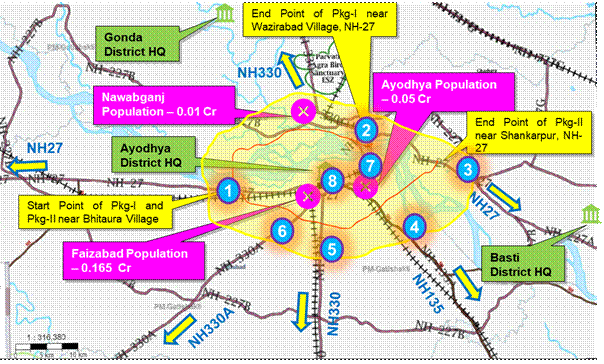
Over the last two years 64 Network Planning Group (NPG) meetings have been held under PM GatiShakti to assess the comprehensive area-based socio-economic development of over 131 infrastructure projects. Ayodhya Bypass Project was evaluated during the 52nd NPG meeting as a critical infrastructure project.
Ayodhya Bypass Project is a 67.57 kms (Construction of 4/6 Lane Northern Ayodhya Bypass total length of 35.40 kms + Construction of 4/6 Lane Southern Ayodhya Bypass; Total length of 32.172 kms) Greenfield project that will cover key districts such as Lucknow, Basti, and Gonda. This project will facilitate improvement in connectivity to economic, social and logistics nodes, including tourist and pilgrim sites, across these three districts.
Figure 1 Ayodhya- Regional Connectivity

Ayodhya is situated between two economic hubs (Lucknow and Gorakhpur) and major commodities such as leather, engineering goods, building materials, iron and steel, etc. pass through the city therefore the construction of this bypass route will facilitate uninterrupted freight flows and decongest the city.
This bypass which is expected to cater to multiple forecasted increase in passenger and freight vehicle movement (from 89,023 in 2023 and 216,928 in 2033) around eight influence areas around Ayodhya, will also enable seamless movement of people and goods, and reduced travel time to critical national highways (such as NH-27: Lucknow– Ayodhya -Gorakhpur; NH-330A: Raebareli -Ayodhya; NH-330: Sultanpur-Ayodhya-Gonda and NH-135A: Akbarpur -Ayodhya).
This project will enhance multi-modality with integrated infrastructure such as Railway Stations (at Ayodhya Railway Station, Sohwal Railway Station, A N Dev Nagar Railway Station and Ayodhya Cantt Railway Station) and Airport (at Ayodhya Airport).
This project is envisaged to complement and bring synergies along with other proposed projects evaluated in NPG meetings including (i) Prayagraj – Raibareili Project (Construction of Prayagraj City bypass (Total Length- 64.763 km) in the state of Uttar Pradesh; (ii) Gorakhpur-Siliguri Corridor- Development of project stretch from Gorakhpur (Uttar Pradesh) to Siliguri (West Bengal); (iii) Gorakhpur-Bareilly Corridor- Development of project stretch from Gorakhpur to Rampur.
Ayodhya’s regional infrastructure significance extends beyond its cultural and historical importance, playing a vital role in the overall development and connectivity of the surrounding areas. The inauguration of the recent international airport in Ayodhya (Maharishi Valmiki International Airport) has marked a significant milestone, providing a convenient air travel option for visitors. This not only boosts tourism but also connects Ayodhya to the national and international transportation grid, fostering economic and cultural exchange.
The Railway Station in Ayodhya (Ayodhya Dham Junction Railway Station) has been redeveloped to meet modern standards, ensuring seamless connectivity with major cities across the country. The revamped station will facilitate movement of 60 thousand commuters compared to the current capacity of 10 thousand. Improved rail infrastructure not only facilitates the movement of people but also supports the efficient transportation of goods, contributing to regional economic development.
Few key features of the redeveloped railway station include:
- Three-storied modern railway station building -equipped with all modern features like lifts, escalators, food plazas, shops for puja needs, cloakrooms, childcare rooms, and waiting halls.
- ‘Accessible for all’ building
- ‘IGBC certified green station building’
Key Highlights:
Major Commodities passing through the city-
- Manufacturing items (leather, textile, plastic & engineering goods)
- Building Material
- Perishable groceries (Fish, dairy, Fruits/Vegetables)
- Others (Oil, Gas, Iron, Steel & Wood)
Efficiencies Generated from the Corridor:
- 5 Km Length Reduction (As the network will provide peripheral connectivity)
- 66.67% Travel time Reduction (1.2hours to 0.4 hours)
- 250% Increment in avg. Speed (40 km/hr. to 100 km/hr)
- 80 L. Person-days of Employment Generation
Environment impact:
- 50 lakhs Litre Fuel Reduction Annually (As the network will provide peripheral connectivity)
- 1 Cr. Kg annually Reduction in carbon footprints (40 km/hr. to 100 km/hr)
- 20 km length -Use of recyclable/reusable material Construction
***
AD/VN



